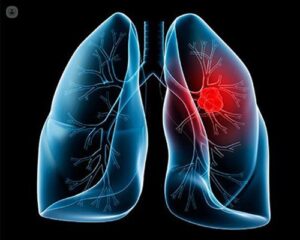Brief about Lung Cancer
Lung cancer is one of the most common and deadly forms of cancer worldwide. It occurs when cells in the lung grow out of control, forming tumours that interfere with normal lung function. In most cases, lung cancer is caused by exposure to carcinogens – substances that cause changes and damage to lung cells’ DNA, causing them to turn cancerous. The primary carcinogen is cigarette smoke, which accounts for 85-90% of lung cancer cases. Best Oncologists in Chennai may be involved in interpreting biopsy results and additional testing like CT scans to confirm the presence and extent of lung cancer. Medical oncologists prescribe and oversee treatments like chemotherapy, targeted therapy, and immunotherapy to kill cancer cells and shrink tumours.

Lung Cancer: Myths vs. Facts
Lung cancer is a devastating disease that affects everyone. With so much misinformation circulating, it can be hard to separate lung cancer myths from facts. This article debunks some common myths and provides the facts about lung cancer and its treatment. Oncologists participate in cancer research, including clinical trials of new lung cancer treatments.
Myth: Lung cancer is always caused by smoking.
Fact: While smoking is the leading risk factor, causing about 80-90% of lung cancer cases, not all cases are due to smoking. Non-smokers can also develop lung cancer from factors like radon gas, secondhand smoke, asbestos exposure, and genetics.
Myth: Lung cancer is always deadly.
Fact: How treatable lung cancer is depends on the type, stage at diagnosis, and access to treatment. If caught at an early stage before spreading, lung cancer can often be treated with surgery and has better survival rates.
Myth: Lung cancer treatment is painful and miserable.
Fact: Today’s combination treatments can have mild side effects like fatigue, nausea, and hair loss. Doctors have many ways to minimize discomfort, including pain medication and palliative care. Quality of life during treatment is improving.
Myth: There’s no point in getting screened if you have smoked.
Fact: Screening with low-dose CT scans can detect lung cancer early when it is most treatable, even in smokers. Screening saves lives.
Myth: If the cancer returns there are no more treatment options.
Fact: New therapies are extending survival for recurrent lung cancer. Targeted drugs, immunotherapies, and other advances are helping treat cancer that returns after initial treatment. You can find the best therapies at virinchi hospital banjara hills hyderabad
Myth: Alternative therapies alone can cure lung cancer.
Fact: Unproven products and tactics are no substitute for evidence-based medical treatment. However, things like acupuncture may help manage lung cancer symptoms when used along with standard care.
Raise awareness about lung cancer:
- Know the symptoms – Persistent cough, coughing up blood, shortness of breath, fatigue, weight loss, chest pain. If these don’t go away, see a doctor.
- Understand risk factors – Smoking, secondhand smoke exposure, radon gas, asbestos, air pollution, family history of lung cancer. Avoid risks whenever possible.
- Get screened – Annual low-dose CT screening for those at high risk due to smoking history can detect lung cancer early when more treatable.
- Don’t ignore a cough – A new cough that hangs on for weeks should be evaluated promptly by a doctor. It may be nothing but don’t take chances.
- Quit smoking – If you smoke, make every effort to quit. If you don’t smoke, don’t start. This is the #1 way to reduce lung cancer risk.
- Limit secondhand smoke – Choose smoke-free environments and ask smokers not to smoke indoors around you. Secondhand smoke increases lung cancer risk.
- Test your home for radon – This radioactive gas can accumulate in basements from surrounding rock. High levels can be reduced via improved ventilation.
- Eat a diet rich in antioxidants – Fruits, vegetables, and whole grains contain antioxidants that may help protect lung cells from carcinogens.
- Get recommended screening tests – Those at high risk due to age and smoking history should get annual screening per guidelines.
Conclusion
Raising awareness empowers the public to reduce lung cancer risk and advocate for early detection. Know the facts and share them with others. The key to sorting fact from fiction is to get informed. Speak to a doctor you trust and consult credible resources to learn the facts about lung cancer. Don’t let myths stand in the way of getting the best care possible to improve health.


